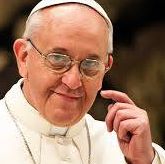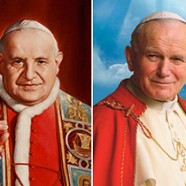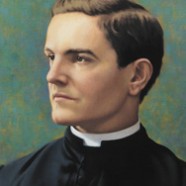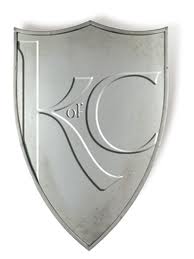Pope Praises Integrity and Loyalty of the Knights of Columbus
THE POPE PRAISES THE INTEGRITY AND LOYALTY OF THE KNIGHTS OF COLOMBUS Vatican City, 10 October 2013 (VIS) – “I wish to express my gratitude for the unfailing support which your Order has always given to the works of the Holy See”, began the Holy Father’s address to the Knights of Columbus, whom he received in audience this morning in the Sala Clementina of the Vatican Apostolic Palace, on the occasion of a meeting held by the Order in Rome. He thanked them for their prayers and witness of faith, and concern for brothers and sisters in need. The Pope described the “Vicarius Christi Fund” as “an eloquent sign” of the Order’s “solidarity with the Successor of Peter in his concern for the universal Church”, made manifest in its daily works. Finally, Pope Francis commended the order to the intercession of St. Joseph, “protector of the Holy Family of Nazareth … an admirable model of those manly virtues of quiet strength, integrity and fidelity which the Knights of Columbus are committed to preserving, cultivating and passing on to future generations of Catholic men”. Published by VISarchive 02 – Thursday, October 10,...
Read MorePopes to be Saints
Pope to canonize Blessed John XXIII, John Paul II April 27 Blesseds John XXIII and John Paul II will be canonized together next April 27, Divine Mercy Sunday. (CNS photos) By Cindy Wooden Catholic News Service VATICAN CITY (CNS) — Recognizing that Blessed John XXIII and John Paul II have widespread reputations for holiness and that years of studying their lives and actions have proven their exceptional virtue, Pope Francis announced he would declare his two predecessors saints at a single ceremony April 27. The pope made the announcement Sept. 30 at the end of an “ordinary public consistory,” a gathering of cardinals and promoters of the sainthood causes of the two late popes. The consistory took place in the context of a prayer service in Latin and included the reading of brief biographies of the two sainthood candidates. Cardinal Angelo Amato, prefect of the Congregation for Saints’ Causes, read the biographies and highlighted the “service to peace” and the impact both popes had “inside and outside the Christian community” at times of great cultural, political and religious transformation. The testimonies of their lives, “completely dedicated to proclaiming the Gospel, shine in the church and reverberate in the history of the world as examples of hope and light,” the cardinal said. Blessed John Paul, known as a globetrotter who made 104 trips outside Italy, served as pope from 1978 to 2005 and was beatified by Pope Benedict XVI on Divine Mercy Sunday, May 1, 2011. Blessed John XXIII, known particularly for convoking the Second Vatican Council, was pope from 1958 to 1963; Blessed John Paul beatified him in 2000. Asked by reporters if retired Pope Benedict would participate in the canonization ceremony, Jesuit Father Federico Lombardi, Vatican spokesman, told reporters it was possible, but given the retired pope’s preference for staying out of the public eye, he could not say for sure. The choice of April 27, which will be Divine Mercy Sunday in 2014, was not a complete surprise. Speaking to reporters traveling with him from Brazil to Rome July 28, Pope Francis said he had been considering Dec. 8, but the possibility of icy roads could make it difficult for Polish pilgrims who would travel by bus to Rome for the ceremony. The other option, he said, was Divine Mercy Sunday, a celebration instituted worldwide by Pope John Paul. Since the beginning of his pontificate in March, Pope Francis has emphasized God’s mercy and readiness to forgive those who recognize their need for pardon. He told reporters on the flight from Brazil that Pope John Paul’s promotion of Divine Mercy Sunday showed his intuition that a new “age of mercy” was needed in the church and the world. Asked on the plane to describe the two late popes, Pope Francis said Blessed John was “a bit of the ‘country priest,’ a priest who loves each of the faithful and knows how to care for them; he did this as a bishop and as a nuncio.” He was holy, patient, had a good sense of humor and, especially by calling the Second Vatican Council, was a man of courage, Pope Francis said. “He was a man who let himself be guided by the Lord.” As for Blessed John Paul, Pope Francis told the reporters on the plane, “I think of him as ‘the great missionary of the church,” because he was “a man who proclaimed the Gospel everywhere.” Pope Francis signed a decree recognizing the miracle needed for Blessed John Paul’s canonization July 5; the same day, the Vatican announced that the pope had agreed with members of...
Read MorePope News
When Pope Francis said in his recent interview that Catholics should not focus so much on abortion, homosexuality, and birth control, many Catholics were taken aback by his comments. It is easy for us to nod our heads in approval when a pope or clergyman tells us that we need to be nice people or combat a habitual sin or sinful tendency that we don’t struggle with. If we are challenged not to be gluttonous when we are temperate and moderate in our eating and drinking, it is easy for us to pat ourselves on that back, maybe even to give thanks that you do not struggle with gluttony. What Pope Francis gives us is a hard saying, so it is only natural we should be rather taken aback. When one is greatly involved in the pro-life movement and one encounters remarks reduced by media coverage to “don’t emphasize abortion”, one is taken for quite the shock. Rather than see this as the Catholic equivalent of saying something shocking for the sake of merely being shocking, we ought to take Pope Francis’s remarks to heart. We cannot focus solely on these issues alone, as if homosexuality, abortion, and contraception were all that the Church had to say to the world. The Church’s mission is about bringing hope into a world beset with despair, subject to futility and death. Christ came to transform our lives and those of others. But we cannot do this by focusing our vision on these topics alone, approaching them with a narrowness of vision. Rather we must see them as part of the Christian good news, along with the other aspects of Christ’s message as elucidated by Catholic social teaching, which corresponds neither to the utopian ideals of a liberalism or the reactionary nostalgia of conservatism. If the prophetic aspect of Christianity includes the messages that correspond with the agenda of the political Right, then we must also include those we find in that of the political Left. We should preach more than just those moral issues with which we are comfortable. Christianity is all about making us uncomfortable, asking us to step outside of our comfort zone by going the extra mile. In his fine book “Bad Religion”, Ross Douthat traces the history and schism of the twentieth century Christian social justice movement that led to the Civil Rights Movement of the 1960’s. One half aligned itself with the Democratic Party that helped legislate many of the reforms of the Great Society, and soon began defending abortion rights when it became a pet cause of the women’s right movement and of the Democratic Party. The other half reacted by supporting the Republican Party, and soon began to neglect the rights of workers, with some even going so far as identifying with the evil philosophy of Ayn Rand (You cannot serve both God and Rand). Both sides have wonderful, commendable values and goals, but they also advocate positions that are in serious conflict with Christianity. That is not to say a Catholic cannot be a Republican or Democrat, only that one cannot compromise or neglect those non-negotiable aspects of the Christian life. That is what Pope Francis is calling us to: the original message of Christianity, which is about far more than the hot-button issues. The primary message of Christianity is Christ’s redemptive work upon the cross, bringing salvation to mankind, and these other issues derive their place in Catholic social teaching because of Christ’s great love for humanity. It is a love which is neither Gentile nor Jew, neither servant nor free, neither liberal...
Read MoreKnights of Columbus Outreach Week – Oct. 4-13
9/20/2013 In honor of St. Francis of Assisi and our Holy Father all Knights of Columbus councils are invited to participate in the “Outreach Week” initiative by conducting charitable programs between Friday, Oct. 4 (the feast day of St. Francis) and Sunday, Oct. 13, in honor of our Pope. St. Francis of Assisi is known as “the man of poverty,” and a central theme of Pope Francis has been service to the poor. Now Knights can show their solidarity with these two holy men than by providing outreach to those less fortunate than ourselves in our communities. The Order has many programs in place to help people who need help. Councils can visit kofc.org/community for ideas on specific programs to conduct. Councils do an outstanding job of assessing needs in their individual communities and developing programs to meet those needs, so they should in no way limit themselves to the program ideas on the website. Whatever a council chooses to do, the important thing is that each and every council do something. While councils are conducting outreach programs during this week and throughout the year, it is important to remember that every program represents a membership recruitment opportunity. A great way to convince a prospect to join the Order ― or to get a current member to be more active ― is to invite him to participate in charitable programs. Encourage each grand knight to tell the Supreme Council about the programs his council conducts during “Outreach Week” by sending an email to fraternalservices. Some of the best programs will be showcased in the Knights in Action section of Columbia, in Knightline and on the...
Read MoreGrand Knight News
This section is still under construction but will be devoted to information from the Grand Knight.
Read More





